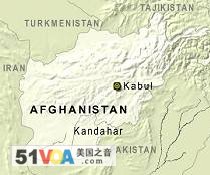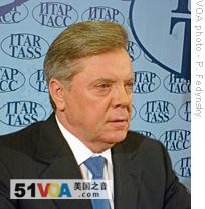Moscow
11 February 2009
 Twenty years have passed since the Soviet Union ended its disastrous military venture in Afghanistan. Some Soviet veterans were traumatized by the war and refuse to talk about it, others reflect on the experience and draw lessons they say apply to NATO forces that have been fighting Afghan rebels since 2001.
Twenty years have passed since the Soviet Union ended its disastrous military venture in Afghanistan. Some Soviet veterans were traumatized by the war and refuse to talk about it, others reflect on the experience and draw lessons they say apply to NATO forces that have been fighting Afghan rebels since 2001. On February 15, 1989, Commanding General Boris Gromov was the last Soviet soldier to leave Afghanistan, walking across the Friendship Bridge that connected that war-torn country with what was then Soviet Uzbekistan.
Nearly 15,000 soldiers, advisors, and other Soviet officials died during the war that Moscow launched in December 1979. Today, Gromov is convinced there are no military solutions to political problems in Afghanistan. He spoke at a recent Moscow news conference.
Gromov says force will accomplish nothing in Afghanistan, and notes that increasing or decreasing troop strength will only bring a negative result. The general says the best way to deal with Afghans is to reach an agreement with them.
 |
| Boris Gromov |
It is a justification rejected by the United States and much of the international community, which saw the invasion as aggressive attempt to expand Moscow's influence. And independent observers note the Afghanistan's drug trade did not affect the USSR, nor did the country have any pipelines that needed protection in 1979.
Anti-Soviet Afghan rebels, known as the Mujahedeen, received some of their weapons from the United States. The irony that some of those rebels joined the Taliban and now fight against U.S. forces is not lost on General Gromov, who especially condemns America's Stinger missile. The Mujahedeen used this shoulder-fired weapon to devastating effect against Soviet aviation.
Independent Russian military analyst Pavel Felgenhauer notes that unlike the Mujahedeen, the Taliban today are not supplied by any foreign government, which could have a bearing on NATO's chances to reach an agreement with their enemy.
Felgenhauer says the Mujahedeen fielded the fighters, but were backed by China, Saudi Arabia and primarily the United States, which supplied them with modern weapons. The Taliban, he says, are not supported by any major country, but rather by certain non-state elements in Pakistan and by al-Qaida.
He notes that General Gromov fought on a Cold War military front, which precluded victory or an agreement with his Afghan enemy. Felgenhauer says agreement is now possible, but warns it will not necessarily happen.
A complicating factor today, he says, is Afghanistan's burgeoning drug trade, which is funding the Taliban. This, he says, forces NATO to fight opium farmers and increases popular opposition to the alliance.
Dmitri Popov fought during the last two years of the Afghan War, beginning as a private and ending as a master sergeant. Today, he heads an Afghan veterans group in Moscow. He says that despite excellent armaments and troop morale, Soviet forces could not overcome the psychology of ordinary Afghans.
Popov says Afghans had a different mission - to defend their liberty against all others. The Afghans, he says, think, "We have lived here for ages; many have tried to conquer us, to impose their faith or culture on us - but we do not need that. We want to live the way we have lived. We want to plow with oxen. We do not need technology or tractors."
Dmitri Popov and General Gromov are skeptical of NATO success in that country. The general says it would be better if Russia, the United States and other countries cooperated on a peaceful solution to Afghanistan.
Gromov says good relations with Afghanistan should be developed by an entire coalition of countries, including the United States. He says that together, all sides can pursue relations in Afghanistan that would end military fighting and give the country a chance to develop.
But analyst Pavel Felgenhauer says Moscow's offer comes at a price.
Felgenhauer says Russia is prepared to help Americans, but only its own terms, in other words, the United States would need to recognize Moscow's sphere of influence in the post-Soviet region.
The analyst says this would include a Russian veto on Ukrainian and Georgian NATO membership, and would require Moscow's approval for developing Western military infrastructure in Romania and the Baltics or deploying a U.S. missile defense system in Central Europe.
U.S. Vice President Joe Biden told the Munich Security Conference on February 7th the United States would not recognize any Russian sphere of influence. At the same time, Biden noted that Russia warned long ago about the rising threat from the Taliban and al-Qaida in Afghanistan. He added that NATO and Russia can and should cooperate to defeat this common enemy.
Meanwhile, U.S. President Barack Obama says the United States will continue to work for a stable Afghanistan that is not a haven for terrorists. He plans to increase U.S. troop strength in Afghanistan and has ordered a strategic review to make sure American goals in that country are clear and achievable. Among those goals is a broader policy that does not focus solely on the military aspect.